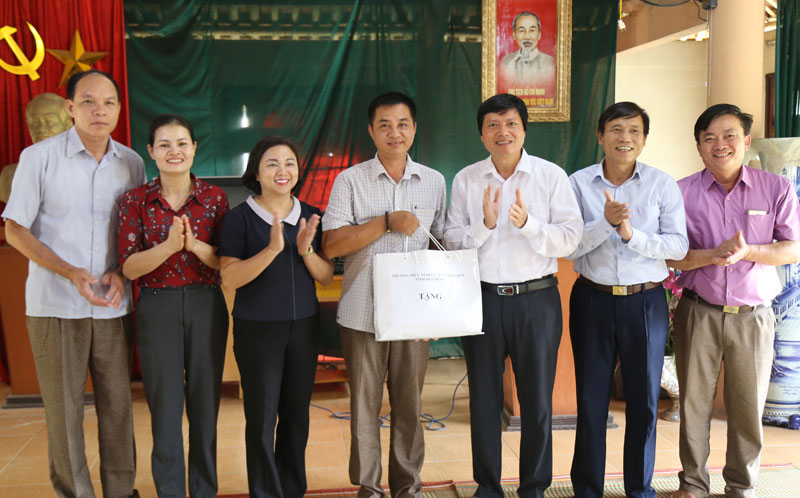
(HBO) – A delegation led by the Deputy Secretary of the Party Committee and Chairman of the People’s Council of Hoa Binh province, Tran Dang Ninh, made a fact-finding tour of Lac Thuy district to examine the building and expansion of self-management models under the instruction of the Vietnam Fatherland Front (VFF), and the piloting of books recording local households’ contributions and the State budget’s financial support for them.
Deputy Secretary
of the provincial Party Committee Tran Dang Ninh and his entourage examine the
self-management model in Luong hamlet of Thuong Coc commune and present gifts
to local residents.
According to the Vietnam Fatherland Front
Committee of Lac Son, the district has maintained effective activities of 420
self-management clans and household groups, 361 reconciliation groups, and 534
security groups. Meanwhile, the project of keeping books on local households’
contributions (excluding fees regulated by the State) and the State budget’s
financial support for them has been piloted in all 28 communes and one township
in Lac Son since November 2017.
Speaking at the working session, Deputy
Secretary of the provincial Party Committee Tran Dang Ninh applauded the
outcomes of self-management models in Lac Son and the bookkeeping project.
He asked local authorities to instruct each
hamlet to set up self-management groups among families basing on local
conditions. This model is very important in the current context because it will
prove effective when hamlets are merged and the number of households and
population increase.
The official also requested the local
administration to review and commend exemplary persons and units in the work.
Meanwhile, it is necessary to continue with the bookkeeping practice in order
to assess this model’s effectiveness before expanding it to the entire Hoa Binh
province.
On this occasion, the delegation of the
provincial Party Committee visited self-management models in the communes of
Trang, La Van Cau, Luong and Thuong Coc. The Deputy Secretary of the provincial
Party Committee presented each model with a set of volleyball equipment. /.
The Standing Board of the Hoa Binh provincial Party Committee has agreed in principle on a proposal by the Standing Board of the Party Committee of Hoa Binh city to gather feedback on the city’s 1:2000 zoning plan, which forms part of its broader urban development strategy.
Hoa Binh province has made notable progress in public administration reform and digital government development, with the satisfaction index among citizens and businesses reaching over 84%, according to recent government evaluations.
Thanks to great efforts by local authorities in recent times, the governance and public administration performance of Mai Chau district has been significantly improved.
In the afternoon of June 6, the Party Committee, the People's Council, the People's Committee and the Fatherland Front of Lac Son district solemnly held a meeting to celebrate the 139th anniversary of the district's founding (1886–2025) and the 79th anniversary of the establishment of the district's Party Committee (1946–2025). There was the attendance of Mr. Bui Van Thang, the Vice Chairman of the Provincial People's Council; Mr. Quach Tat Liem, the Vice Chairman of the Provincial People's Committee; Ms. Dang Bich Ngoc, the Deputy Head of the National Assembly Delegation of the province; as well as the former leaders of the province and district through various periods, who are the natives of the district.
Implementing the Politburo’s Resolution No. 57-NQ/TW on breakthroughs in science – technology, innovation, and digital transformation is a golden opportunity for the northern mountainous province of Hoa Binh to renew growth model, improve competitive edge and shorten digital gap.
Resolution 57-NQ/TW, issued by the Politburo on December 22, 2024, identifies sci-tech, innovation, and digital transformation as strategic breakthroughs to build a developed and prosperous nation. In Hoa Binh province, this spirit is not just a slogan, it’s being put into action through concrete initiatives that form a "new development triangle”: digital citizenship, digital economy, and digital administration.



